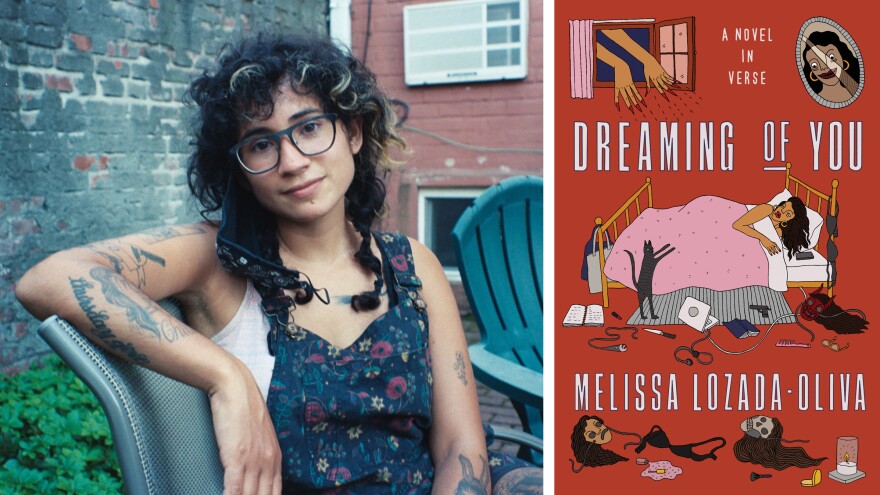Selena Quintanilla-Pérez is having a moment — again.
Twenty-six years after her murder, the Tejano pop star's face still adorns T-shirts and hoodies. She's the subject of a new Netflix series and a podcast.
And now in a book by poet Melissa Lozada-Oliva, Selena is also coming back from the dead.
Dreaming of You is a new novel Lozada-Oliva describes as somewhat of a "rock opera" involving heartbreak, karaoke, celebrity worship and self-realization.
Lozada-Oliva talked with NPR's Asma Khalid on Weekend Edition about her early interest in Selena, her own identity, and imagining what would have happened if Selena had not been killed at a young age.
Interview Highlights
On being a fan of Selena and reflecting on her legacy
I think all of this kind of started with me trying to deconstruct it — what it meant for me to be a Selena fan. I feel like I grew up under the umbrella of her life, right after she died, and so much of being her fan was also wanting to look like her. And I remember just feeling so beautiful whenever I kind of looked like Selena. It's so weird, kind of falling in love with somebody and them being completely gone. And for me, something that really drew me to Selena is how she just fell in love so fast. How at the end of the day, kind of a lot like Princess Diana, actually, she was just this girl in love who was really innocent and giving.
I think today, for people looking back at her music, unfortunately, a lot of it is wrapped up in her tragic death. And I became really interested in: what if she lives, you know? Like what if she grew up and became older and problematic, and liked problematic tweets and made corny videos and made uncomfortable statements during tumultuous times? So she's forever stuck in this moment of being this 23-year-old girl who's extremely talented and beautiful, and it's almost like we love her there. And I don't know, that's weird.
On the main character, Melissa, and her quest to bring Selena back to life
She's having this identity crisis. She's really obsessed with being seen. She really is not feeling like enough and thinks that bringing back this pop star who she is obsessed with and mourning will somehow fix everything. Everyone's motives for bringing back someone to life are pretty messed up. I think generally, the consensus every time someone is resurrected, it's like — don't do it. She's just a woman who makes a decision, and that decision is a huge mistake. But in order to find out who she is, she feels like she has to do this.
On writing poems from the point-of-view of Yolanda Saldívar, the president of Selena's fan club who is serving a life sentence for the singer's murder
I still think the conversation about Yolanda Saldívar — who is a murderer — has been overwhelmingly not nuanced. So frequently I hear, "I am so happy that crazy lesbian is in jail." But I wanted to shine a complicated light on her, because it's too easy for us to be like, "OK, one is a hero, and one is a villain."
I think Yolanda and Selena for so long were — and [still are] — seen as this yin and yang, two forces of good and evil. And that's not true. They were just two women who were both deeply affected by patriarchy and acting as such.
On the messiness of Latinidad and representation
Because I came up as this Latina poet, I felt a lot of pressure to be this person that I wasn't or [to write] poetry that I didn't necessarily want to do. You know, I kind of just wanted to write horror stories. And these horror stories do inform my Latina identity and my intergenerational trauma, but I didn't want to be, like, capital R, "Representation Matters," because this is the thing about representation — sometimes it's not about being seen; it's about being sold. I don't want to do that with my art or my soul.
On growing up in Newton, Mass., and constructing an identity through Selena's music
I grew up in The Lake of Newton — which is often called the "armpit of Newton" — and it's a very Italian neighborhood. So my older sister is really responsible for my introduction to Selena. One of my first memories is her 13th birthday party, taking us to go see the Selena movie.
My mom didn't really let us out of the house because she was really afraid we would get kidnapped, so I became a writer because I had nothing to do. I'm writing a lot, and I also was watching the Selena movie over and over again and listening to Selena's songs. And then, you know, I think because Newton was so not diverse, I was clinging on to this image of the Latina of my life — who is Selena, who very much when we think of a Latina and what a Latina "should look like," we're thinking of Selena. I think that was a big, formative part of my identity. I'm also not Mexican, I'm not from Texas; my dad is from Colombia, my mom is from Guatemala. I didn't really come up like Selena, but I still saw so much of myself in her. But maybe just because I wanted to.
Isabella Gomez Sarmiento and Melissa Gray produced and edited the audio interview.
Copyright 2021 NPR. To see more, visit https://www.npr.org.



